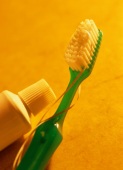- Could Your Grocery Store Meat Be Causing Recurring UTIs?
- Are You Making This Expensive Thermostat Error This Winter?
- Recognizing the Signs of Hypothyroidism
- 10 Strategies to Overcome Insomnia
- Could Artificial Sweeteners Be Aging the Brain Faster?
- Techniques for Soothing Your Nervous System
- Does the Water in Your House Smell Funny? Here’s Why
- Can a Daily Dose of Apple Cider Vinegar Actually Aid Weight Loss?
- 6 Health Beverages That Can Actually Spike Your Blood Sugar
- Treatment Options for Social Anxiety Disorder
Dentists Offer Tips to Keep Young Children Cavity-Free


Good dental habits begin at an early age, but many parents fall short when it comes to the health of their children’s teeth, experts say.
“Parents who would not dream of letting their toddler bathe alone give the same child total responsibility for brushing,” Dr. Gretchen Henson, a dentist at Interfaith Medical Center in New York City said in a center news release.
“Misinformation abounds, and it has become common for children to spend the entire day snacking and drinking beverages that can lead to serious tooth decay,” added Henson, the hospital’s program director of advanced education in pediatric dentistry.
Prevention of tooth decay and other problems can begin in children as young as 6 months, Henson said.
Dr. Jessica Marn, assistant program director, pointed out that “many people are surprised that we encourage infant well visits before a child even has teeth, but these visits are 90 percent about education and diet.”
Marn and Henson offered the following advice to parents:
- Clean infants’ gums with a soft cloth after feeding them, and never let infants and toddlers sleep with bottles of milk or juice. Also, never dip a pacifier in honey or other types of sweeteners.
- Tooth decay bacteria are highly contagious and easily transferred on items such as spoons or pacifiers. Don’t let grandparents or nannies share utensils with babies or kiss them on the mouth. Never lick a pacifier to clean it.
- Don’t let children snack all day, because even the most healthy snacks can leave residue that feeds tooth-rotting bacteria. If you do give children snacks, it should be fresh fruit or other whole foods, instead of packaged or sticky foods such as gummy bears, fruit roll-ups or dried fruit.
- Fruit juice — even if it’s organic — is as dangerous to teeth as soda because of the high sugar content. Give your child water instead.
- Brush young children’s teeth twice a day using an amount of fluoride toothpaste the size of a grain of rice. The age when children can start brushing by themselves varies by individual. A child who can tie their own shoelaces or make a ponytail may have the manual dexterity required to brush their own teeth. Children should start flossing when they have two teeth that touch.
More information
The U.S. National Library of Medicine has more about child dental health.
Source: HealthDay
Copyright © 2026 HealthDay. All rights reserved.










